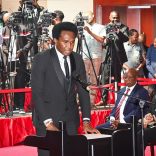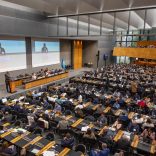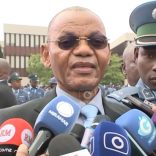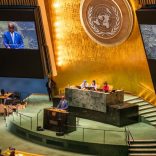Mozambique: Venâncio Mondlane takes seat on Council of State - AIM report
Amendment to the Mozambican constitution is an “accommodation of the will of two people” – academic

Severino Ngoenha. File photo: La Cartografia
Mozambican philosopher Severino Ngoenha believes that the amendment of the country’s constitution reflects an “accommodation of the will of two people”.
Rector of the Technical University of Mozambique, Ngoenha means the president of Mozambique and the Mozambican Liberation Front (Frelimo), Filipe Nyusi, and Afonso Dhlakama, leader of the main opposition party, the National Mozambican Resistance (Renamo).
“Two people talk on the phone and come to a decision. The decision is read in public and then sent to parliament. After all, what is parliament really? It is not the first place for public debate,” he says.
Filipe Nyusi announced last week that provincial governors and district administrators would be nominated by those who win the elections to their respective assemblies, instead of being appointed by the central power, according to a proposed revision of the constitution deposited in parliament.
Hundreds of people marched in support of Nyusi in Manica
The head of state announced that the proposal was part of an agreement with the Mozambican National Resistance (Renamo) for peace in Mozambique.
The same document proposes that mayors no longer be directly elected but be appointed by municipal assemblies.
“This agreement is structurally weak because it comprehends the dynamics of two parties and leaves aside the popular will,” Ngoenha assertes, adding that a bipartisanship has been created which reduces other Mozambican political parties to dummies [“peças de figurino”].
Analysing the content of the proposal for revision of the constitution, Ngoenha comes to the conclusion that the biggest winner will be the party as a political institution, inasmuch as the scheme that has been set up favours the emergence of large “partisan apparatuses”.
“The decentralisation proposed has recaptured power. The political party will be the new monarch,” the philosopher says, adding that withdrawing the right to a direct vote in mayoral elections reveals that politics is ignoring the real problems of the people.
Simplify the electoral process for the municipal assembly is justified as being the same for all levels of administration – that is, the election of an assembly which then indicates who leads.
The proposal to revise the constitution generated another debate in Mozambique, with nongovernmental organisations and the Mozambican Democratic Movement, the country’s third party, saying a referendum was needed.
They justify this on the basis that the constitution states that “amendments to universal, direct, secret, personal, equal and periodic suffrage must be subject to a referendum in the designation of the elected officials of the organs of sovereignty of the provinces and of local power”.
For Ngoenha, a referendum would have been a positive thing if the debate had been open from the beginning, but the way things are, the people’s response can only be yes, otherwise the country will return to military conflict like that of 2015-2016.
“A great referendum or a great debate should have taken place ‘a priori’, so that any change to the constitution was not simply an accommodation between the ruling party and the opposition,” he concluded.












Leave a Reply
Be the First to Comment!
You must be logged in to post a comment.
You must be logged in to post a comment.